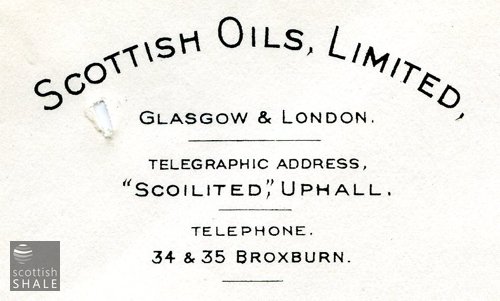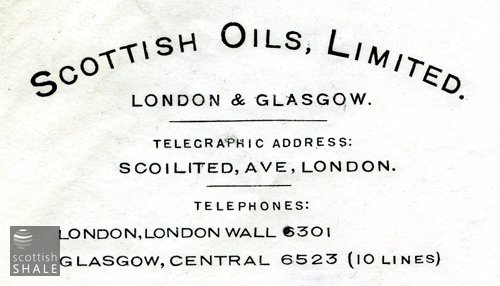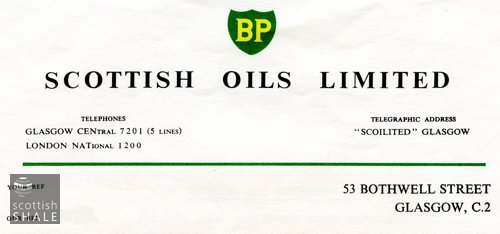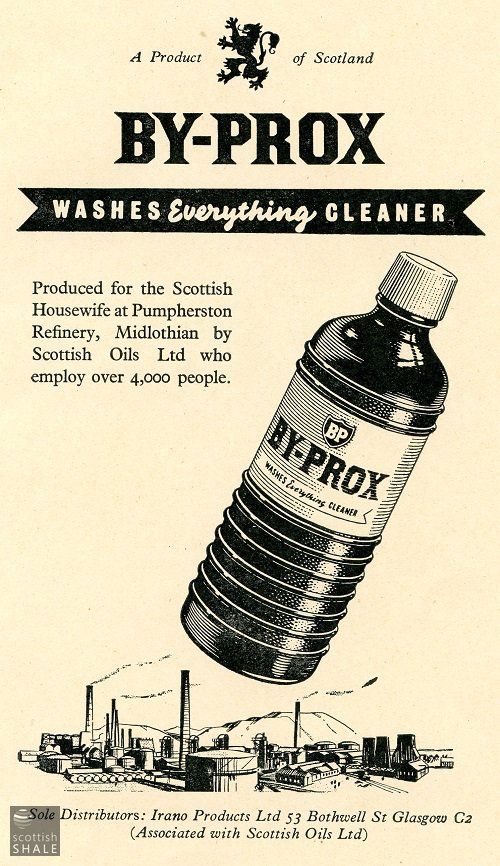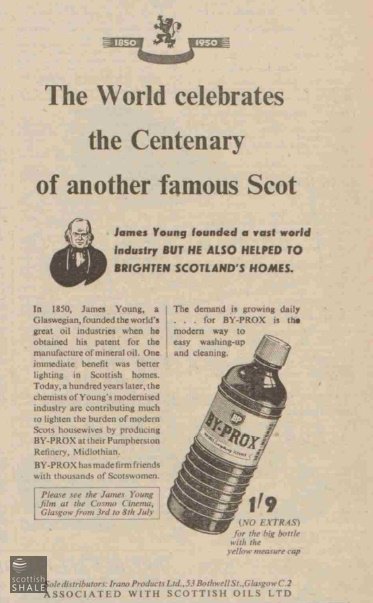- Abercorn Oil Co.
- Adam & Hamilton
- Airdrie Mineral Oil Co. Ltd.
- Alan Craig & Sons
- Alexander Law & Co.
- A.M. Fell & Co.
- Andrew Spencer (firm)
- Andrew Taylor (firm)
- Andrew Walker & Sons
- Annick Lodge Oil Co.
- Annick Lodge Oil Co. Ltd.
- Archibald Finnie & Sons
- Archibald Hood
- Auchinheath Chemical Company
- Avonhead Coal Company
- Bain & Carlile
- Bain & Drummond
- Bathgate Oil Co. Ltd
- Benhar Coal Co. Ltd.
- Binnend Oil Co. Ltd.
- Blackburn Mineral Oil Co.
- Blackston Mineral Oil Co.
- Bredisholm Oil Co.
- British Oil & Candle Co. Ltd.
- Broxburn Oil Co. Ltd.
- Broxburn Shale Oil Co. Ltd.
- Burntisland Oil Co. Ltd. (1881)
- Burntisland Oil Co. Ltd. (1893)
- Cairns & Co.
- Calder Oil Co.
- Caledonian Mineral Oil Co. Ltd. (1889)
- Caledonian Mineral Oil Co. Ltd. (1898)
- Caledonian Oil Co.
- Capeldrae Coal & Oil Co. Ltd.
- Cawburn Oil Co.
- Cityside Coal & Oil Co.
- Clarkson & Spence
- Clippens Oil Co. Ltd. (1878)
- Clippens Oil Co. Ltd. (1893)
- Clippens Shale Oil Co.
- Clydesdale Chemical Co.
- Coatbridge Oil Co.
- Crofthead Oil Co.
- Dalmeny Oil Co. Ltd. (1871)
- Dalmeny Oil Co. Ltd. (1896)
- Dalserf Coal, Coke & Oil Co. Ltd.
- Daniel Wylie & Son.
- David Hamilton & Co.
- Dickson Candle Co. Ltd.
- Douglas & Boag
- Dr. James Steele (firm)
- Drumgray Coal Co.
- Dundas Shale Oil Co.
- East Hermand Shale Co.
- Eldin Oil Co.
- E. Meldrum & Co.
- E.W. Binney & Co.
- E.W. Fernie & Co.
- Fraser & Meikle
- George Gray
- George Hutchison & Co.
- George Miller & Co.
- George Shand & Co.
- Glasgow Oil Co. (Broxburn) Ltd.
- Glentore Mineral Oil Co. Ltd.
- Hamilton, McCulloch & Co.
- Henry Tod (firm)
- Hermand Oil Co. Ltd (1885)
- Hermand Oil Co. Ltd (1890)
- Holmes Oil Co. Ltd.
- Inverkeithing Oilwork Co.
- James Anderson & Son
- James Gemmell
- James Greenshields & Son
- James Liddell & Co.
- James Miller
- James Miller, Son & Co.
- James Nimmo & Co.
- James Palmer & Co.
- James Ross & Co.
- James Ross & Co. (Philpstoun Works) Ltd.
- James Struthers & Co.
- James Young & Co.
- J & E Robinson
- John and James Baird
- John Baird
- John Barr & Co.
- John Miller & Co.
- John Nimmo & Son
- John Poynter & Son
- John Robertson Junior & Co.
- John Vallance & Co.
- John Watson & Sons
- John Wield (firm)
- J.P. Raeburn
- Kirkliston Oil Co.
- Lanark Oil Co. Ltd.
- Leavenseat Oil Co.
- Lester, Wyllie & Co.
- Linlithgow Oil Co. Ltd.
- Lochgelly Iron & Coal Co.
- McNaughton & Aitken
- Methil Paraffin Oil Co.
- Mid-Calder Mineral Oil Co. Ltd.
- Midlothian Mineral Oil Co. Ltd.
- Midlothian Oil Co. Ltd.
- Monkland Iron Co. Ltd.
- Monkland Oil & Coal Co. Ltd.
- Monkland Oil Refining Co. Ltd.
- Mungle & Thornton
- New Hermand Oil Co. Ltd.
- Nish, Gibb & Co.
- Nitshill & Lesmahagow Coal Co.
- North British Oil & Candle Co. Ltd.
- Oakbank Oil Co.
- Oakbank Oil Co. Ltd.
- Oakbank Oil Co. Ltd. (1868)
- Peter Drummond
- Peter Scott (firm)
- Pirnie Coal Co.
- Pumpherston Oil Co. Ltd.
- Pumpherston Shale Oil Co.
- Raebog Oil Co.
- Rankine & Mitchell
- Robert Bell & Co.
- Robert Binning & Co.
- Robert Galloway & Co.
- Robert Steuart & Co.
- Robinson, Donald & Co.
- Rowatt & Yooll
- Scottish Mineral Oil & Coal Co.Ltd.
- Scottish Oil Co. Ltd.
- Seafield Patent Fuel Co.
- Shettleston Oil & Chemical Co. Ltd.
- Smith Brothers & Muurling
- South Cobinshaw Oil Co.
- Stanrigg Oil Co.
- Straiton Estate Co. Ltd. (Straiton Oil Co. Ltd)
- Tarbrax Oil Co. Ltd.
- Thomas Carlile & Co.
- Thomas Hutchison
- Thomas & James Thornton
- Thomson, Lockhart & Co.
- Uddingston Oil Co.
- Uphall Mineral Oil Co.
- Uphall Mineral Oil Co. Ltd.
- Uphall Oil Co. Ltd.
- Walkinshaw Oil Co. Ltd.
- West Calder Oil Co.
- West Calder Oil Co. Ltd.
- Westfield Oil Co. Ltd.
- West Lothian Oil Co. Ltd
- West Lothian Oil Co. Ltd.
- Westwood Oil Co.
- William Black & Sons
- William Black & Sons Ltd.
- William Brown & Co.
- William Fraser & William Fraser junior
- William M'Lintock & Co.
- William Taylor & Co.
- W. & T. Kelt
- Young's Paraffin Light & Mineral Oil Co. Ltd.
Scottish Oils Ltd.
53 Bothwell Street, Glasgow (12th September 1921)
A limited company, created under state direction during World War One, to merge the intersts of the surviving shale oil companies. In the previous year, the marketing and distribution operations of these companies had been combined as the Scottish Oil Agency Ltd.
Scottish Oils Ltd operated as a subsiduary of the Anglo-Persian Oil Co. Ltd in which the government had a controlling interest. The new company immediately concerned itself with the development of a new refinery at Grangemouth to process imported crude oils.
Directors
The first directors of the company are listed below:
- Charles Greenway - 1919-1928 (Chairman from 1919-1922) (image below)
- Sir William Fraser - 1919-1956 (Chairman from 1943-1956)
- Sir Frederick William Black - 1919-1922
- Duncan Garrow - 1919-1926
- James Mackay, Rt Hon. Lord Inchcape
- Sir John Buck Lloyd - 1919-1946/47
- Herbert Edward Nichols - 1919-1927
- John Douglas Stewart - 1919-1925
- Robert Irving Watson - 1947-1947
- Edward Hussey Packe - 1920-1947
- Sir John Traill Cargill - 1923-1943 (Chairman from 1923 to 1943)
- John Swanwick Bradbury, Rt Hon. Lord Bradbury - 1925-1928 (image below)
- Lord Sir John Cadman GCMG - 1926-1941 (image below)
- Sir George Lewis Barstow - 1928-1947 (image below)
- James Bryson - 1929-1930
- Robert Crichton - 1929-1952 and 1954-1954
- Sir Hubert Bryan Heath Eves - 1926-1950
- R.A. Murray - 1931-1937
- Field Marshal Alan Francis Brooke, 1st Viscount Alanbrooke - 1947-1954 (image below)
- Sir Percival Robinson - 1947-1949
- Sir John Henry Dacres Cunningham, Admiral of the Fleet - 1948-1949 (image below)
- Sir Kenneth Brand Harper - 1949-1957 (image below)
- Sir Thomas Robert Gardner - 1950-1953
- Basil Rawdon Jackson - 1950-1957 (Chairman from 1956-1957) (image below)
- William Johnston Keswick - 1950-1960 (image below)
- Frederick Evelyn Harmer - 1953-1960
- John Martin Caldwell - 1952-1962
- Harold Ernest Snow CBE - 1954-1954 and 1957- (image below)
- Sir Richard Gordon Munro - 1954-1957 (image below)
- Sir Neville Archibald Gass KBE - 1956-1960 (image below)
- Sir Harold Ernest Snow CBE - 1956-1961
- Lt Gen. Ronald Morce Weeks. The Lord Weeks - 1957-1960 (image below)
- Duncan Anderson - 1956-1961
- William Ewing Eadie - 1957-1960
- Hon. Maurice Richard Bridgeman CBE - 1960-1969 (Chairman from 1960-1969) (image below)
- Sir Arthur Eric Courtney Drake CBE - 1962-1971 (Chairman from 1969-1972) (image below)
- John Mellor Pattinson - 1962-1965 (image below)
- Maurice Alfred Lister Banks - 1962-1967
- Dr Willison Bryce Peutherer - 1962-1969 (image below)
- Robert Young Gilchrist - 1963-1965
- Sir William Fraser - 1969-1970
- Alister Frederick Down OBE - 1969-c1971
- Robert Bryan Dummett - 1969-c1971
- Fraser Murray Cook - 1969- (Chairman from 1972)
- Alan Murray Robertson - 1971
- David Bruce Robertson - 1971
- David Lessels Williamson - c1971-1973
- F.C.K. Cuthbert - 1973-
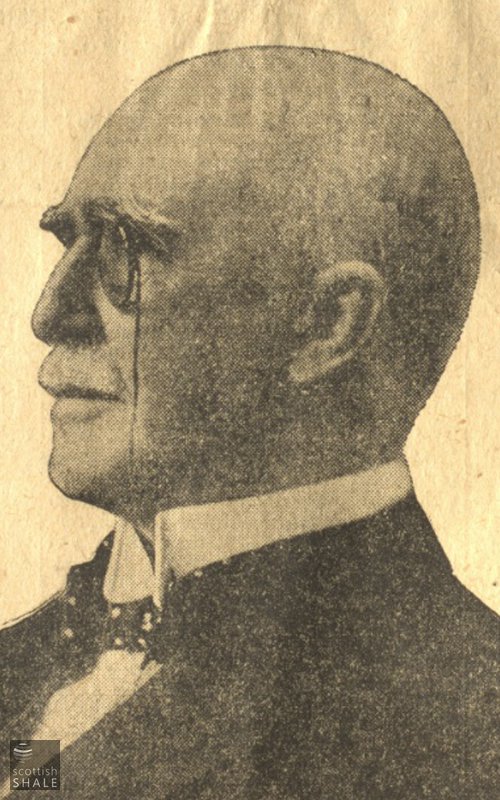
Charles Greenway

John Swanwick Bradbury, Rt Hon. Lord Bradbury
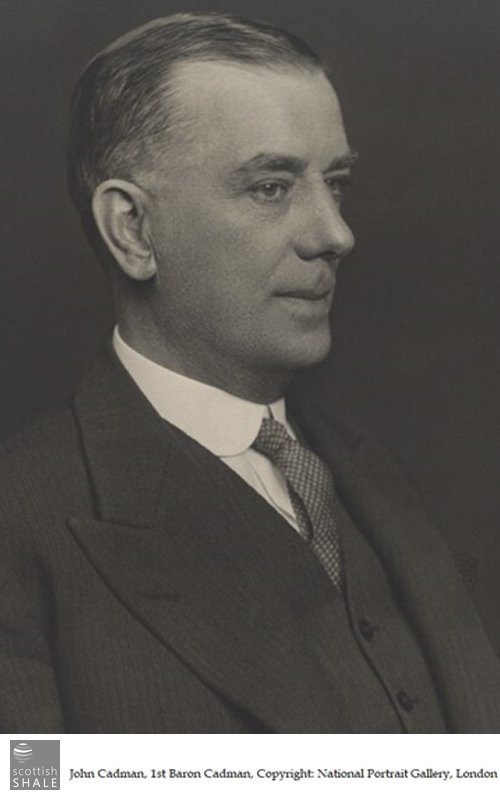
Lord Sir John Cadman GCMG
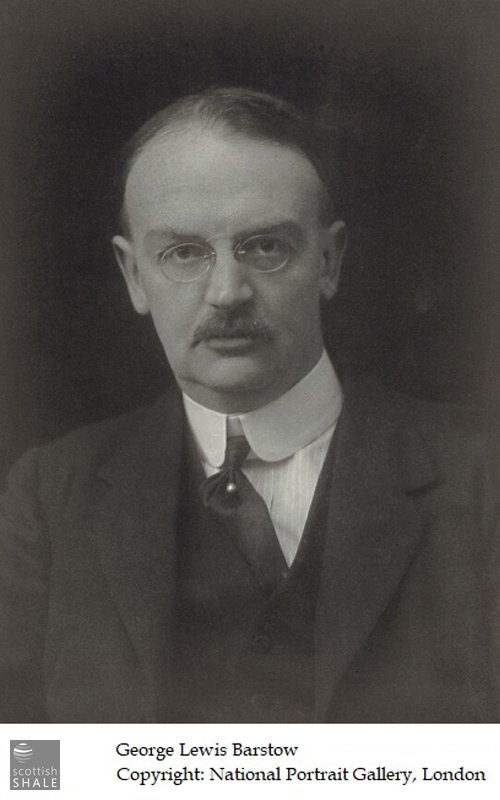
Sir George Lewis Barstow

Field Marshal Alan Francis Brooke, 1st Viscount Alanbrooke

Sir John Henry Dacres Cunningham, Admiral of the Fleet
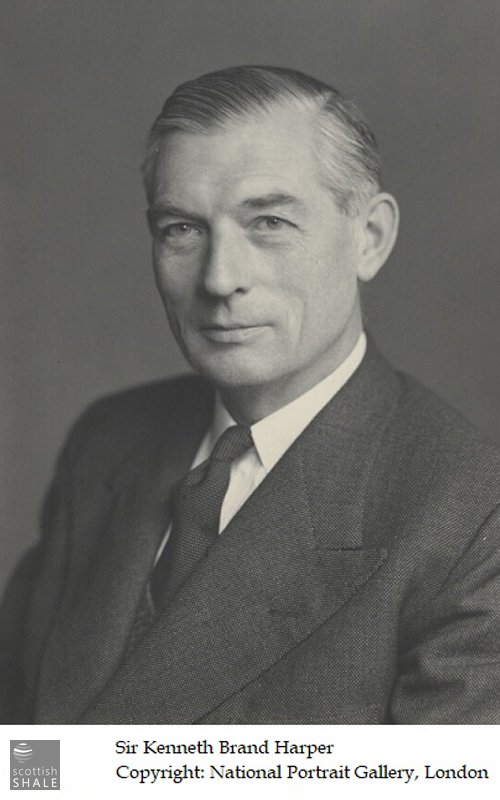
Sir Kenneth Brand Harper
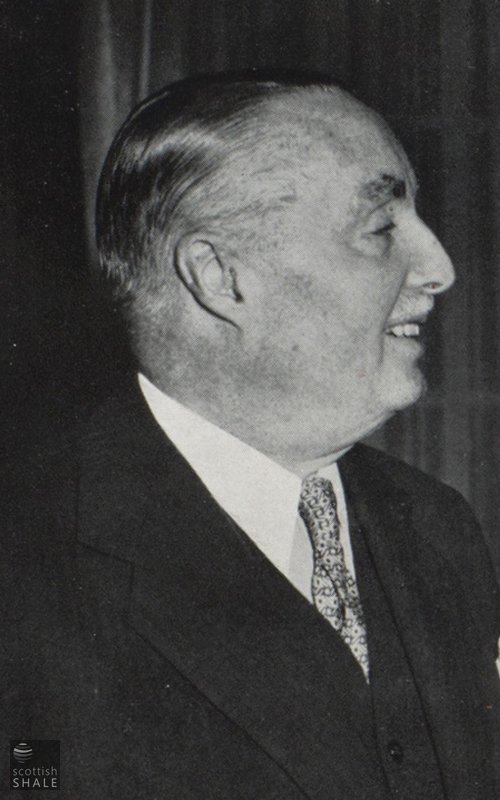
Basil Rawdon Jackson
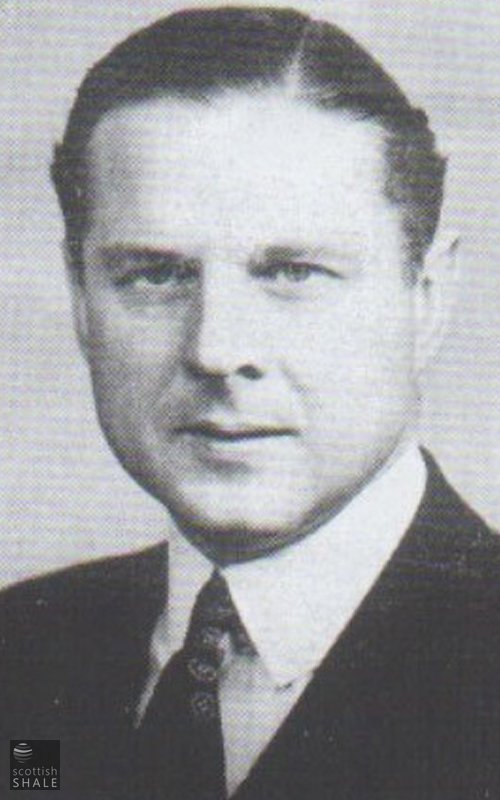
William Johnston Keswick
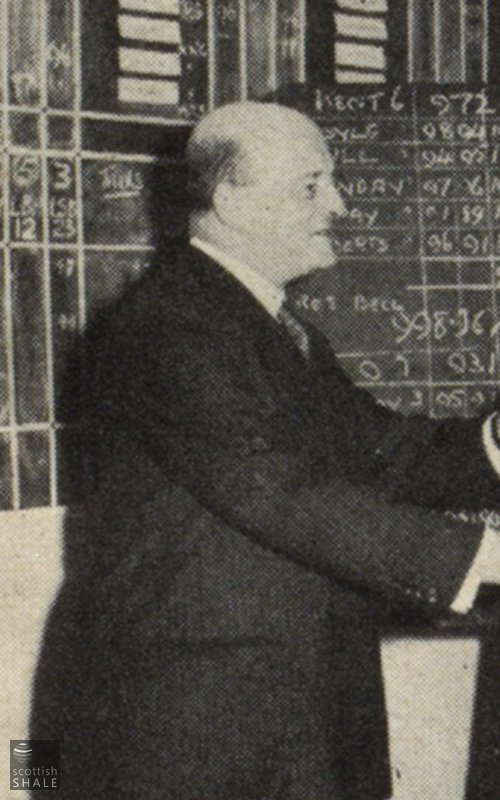
Harold Ernest Snow CBE
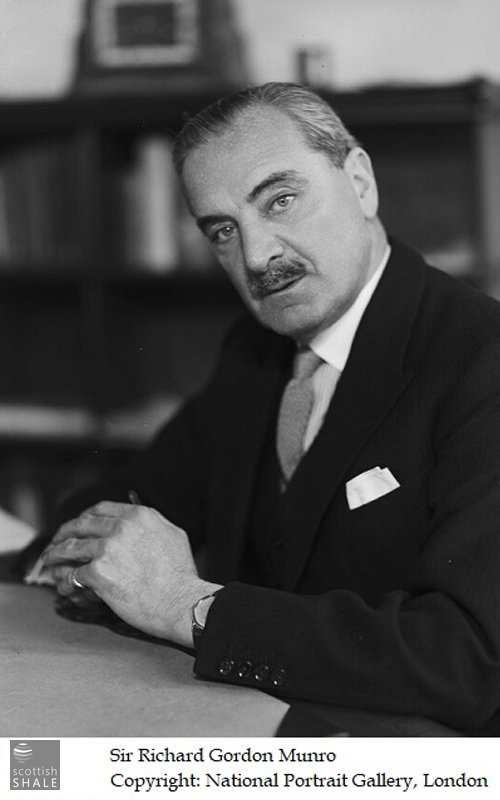
Sir Richard Gordon Munro
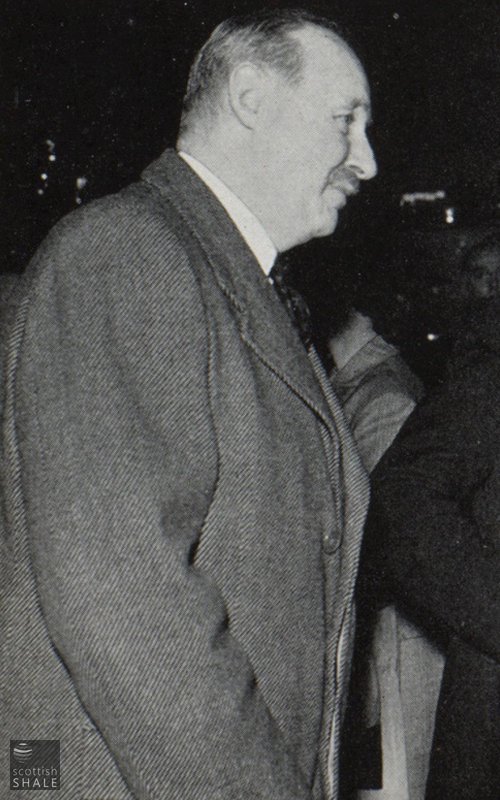
Sir Neville Archibald Gass KBE
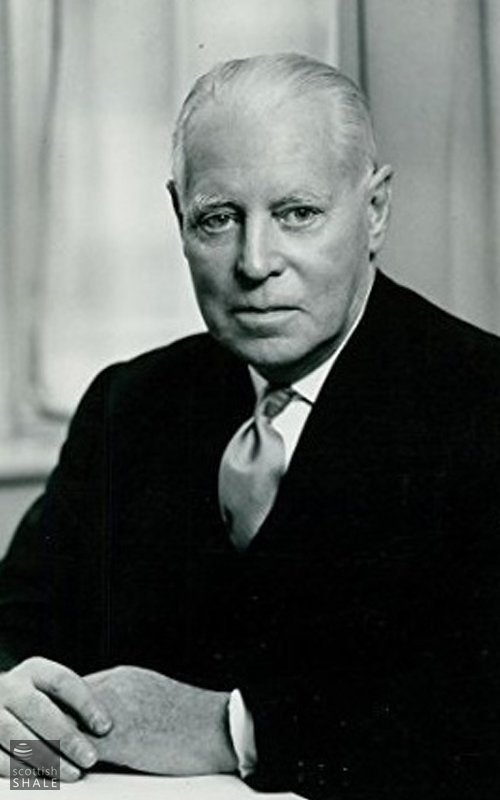
Lt Gen. Ronald Morce Weeks. The Lord Weeks

Hon. Maurice Richard Bridgeman CBE

Sir Arthur Eric Courtney Drake CBE
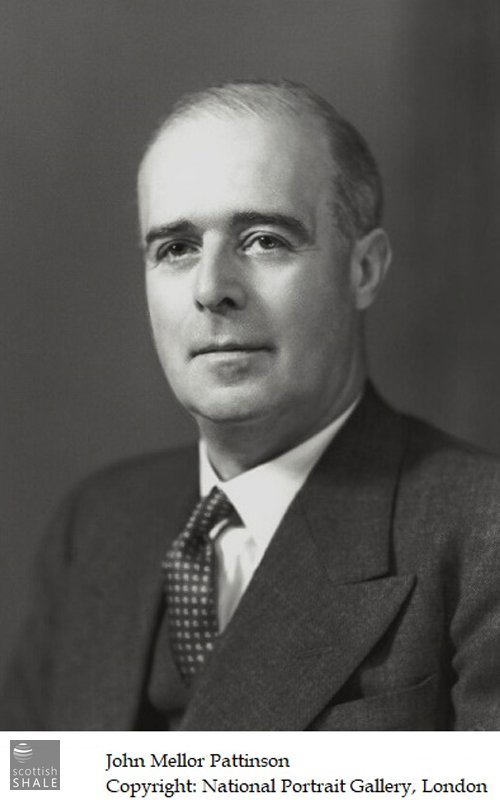
John Mellor Pattinson
Secretaries
- John Watson Reoch - 1919-1935
- Robert Wilson Meikle - 1919-1946
- T. MacDonald - c1953
- James Ewing Bryce Martin - ????-1952
- Robert Young Gilchrist - 1952-1963
- John McWilliam Brodie - 1963-1974
- Kenneth Harwood Parke - 1967-1974
- David A. Godwin Sarre - 1974
Trademarks
Particulars of trademarks registered by Scottish Oils Ltd.
| Trademark | Trademark Title | Registration Number | Date of Registration | Goods Specified |
|---|---|---|---|---|
| Somul | Somul | 476041 | 6th April 1927 | Raw, or partly prepared, vegetable, animal and mineral substances used in manufactures, not included in other classes |
| Mulspray | Mulspray | 476042 | 6th April 1927 | Manufactures from mineral and other substances for building or decoration |
| Paracoke | Paracoke | 807181 | Unknown | Paraffin Coke |
BUSINESS NOTES. Scottish Oils, Ltd.— Some interesting information regarding the Scottish Oils, Ltd., the company which has acquired the properties of the Scottish shale oil companies, is contained in a statutory report issued yesterday. The total number of shares allotted the Scottish Oils, Ltd., is 3,763,940, of which 1,000,000 are ordinary shares of £1 each, on which the sum of 3s. per share has been paid in cash, and 2,763,940 are preference shares of £l each, all of which preference shares are allotted, fully paid up otherwise than in cash, to the extent of 20s per share, in consideration of the transfer the allottees to the Company of the ordinary shares in the Pumpherston, Broxburn, Oakbank, and Youngs concerns, and in James Ross & Company. The preliminary expenses of the Company are £50,000. It is proposed at the statutory meeting on 30th December to modify the agreement dated 26th September, 1919, between the British Petroleum Co., Ltd., and the Homelight Oil Company, Ltd., on the one hand, and the new Company on the other hand, by having the assets contracted to be purchased from the two first-named concerns sold and transferred to the Scottish Oil Agency, Ltd.
The Dundee Courier, 23rd November 1919
.......
SCOTS OILS BOMB - WORKS AND MINES TO CLOSE - 2000 JOBS LESS
A bombshell fell on the Scottish oil trade districts, yesterday, when it became known that Scottish Oils Ltd., had decided to close down a considerable section of their mines and works. The oil trade is centred in Mid and West Lothian, and in part of Lanarkshire, and quite a wide area is affected by the restriction of operations. At a meeting at Uphall, yesterday, the general manager of Scottish Oils, Ltd., explained the position to the officials and also to the shale and oil workers' agents and representatives of the men.
SERIOUS LOSSES
It appears that for some time past operations have been carried on at a serious loss, and the company decided to close down the shale and coal mines, and also the oil works at Tarbrax, Lanarkshire. The decision will practically mean the extinction of the village of Tarbrax, where about 500 workmen reside. At Dalmeny, mining operations will be stopped; at Broxburn operations are to be seriously curtailed, and it is probable that in all nearly 2000 workmen will be thrown idle. With the mining labour market in a dull condition, the outlook for the large body of men affected is a serious one.
Daily Record, 29th August 1925
.......
Scottish Shale Oil
Whilst general regret will be occasioned by the decision of the directors of Scottish Oils (Limited) to curtail operations in the shale oil branch of their business, the announcement will have come as a surprise to very few. For several years the company has devoted its attention more and more to the refining of imported Persian crude, and now that this branch of the business has become firmly established on a profitable basis, the doubtful prospects of the older industry must have grown even less attractive. The directors have at no time offered the hope that shale mining in Scotland might be brought back to its former state of prosperity, but it is more than probable that if operations could have been continued without actual loss every effort would have been made to keep the industry alive. Apart altogether from all feelings of sentiment – and the Scottish Oils directors have not shown themselves lacking in public spirit – it would have been good policy to preserve this additional source of raw material in the event of a future shortage of imported crude.
Costs and Profits
Unfortunately the experiences of the past year have not been encouraging. Economies have been effected, but the limit in this direction has been reached, and in the meantime selling prices have dropped from 25s a ton in 1920 to about 12s 3d to-day. By-products are also declining in price, sulphate of ammonia in particular meeting keen competition from synthetic and foreign substitutes. Paraffin wax is produced in sufficient quantities from imported crude to meet the limited demand, while the Scotch oil itself – once the prime favourite of the owners of internal combustion paraffin motors on account of its extra power – has lately been largely displaced in popular favour by the cheaper Russian kerosene. All things considered, there is little either in present experiences or immediate prospects to induce the directors to keep the industry alive, and their action in offering to carry half the burden of the present reductions in costs of production is highly commendable.
Glasgow Herald, 1st September 1925
.......
Oil Trade Crisis - Consternation in shale district - Nearly 2000 Workers Affected
In accordance with the verbal intimidation conveyed to the Executive Committee of the National Union of Shale Miners and Oil workers at Middleton Hall, Uphall, on Friday afternoon, Scottish Oils (Limited) posted notices on Saturday morning at the various works and mines in Broxburn, Newliston, Ingliston, Dalmeny, Tarbrax, and Woolfords, intimating to all employees that their employment with the company would terminate on Tuesday, 15th September, and after that date employment would be from day to day only. The only exceptions to this notice were those workmen employed at the acid works and candle works, Broxburn. The workers still employed will be asked to consent to a reduction of wages, amounting in the case of pieceworkers to 10 per cent., and to 1s a day in the case of wage workers.
FEELING OF CONSTERNATION
The company's announcement has caused a feeling of consternation in Broxburn and district, and there are already suggestions that a public meeting should be called to obtain an expression of opinion as to the advisability of taking action in the way of petitioning the Government for support for the industry during the present trying period. It is argued that the amount of money that will have to be paid in the name of unemployment benefit to 1800 workers might be more profitably applied in the payment of wages. The decision was made known on Friday at a conference between the Shale Miners' and Oil Workers' Union and the directors of the company at Middleton Hall Works, Uphall. Operations are to stop at the following works and mines:- Dunnett mine, Broxburn; Albyn crude works, Broxburn; Broxburn refinery (except acid and candle works); Newliston and Ingliston mines; Dalmeny oil works; Woolford coal pit, West Calder; Tarbrax oil works and mines. It is stated that Broxburn refinery will be put upon foreign crude oil as soon as arrangements have been completed to do so.
ECONOMIC DEPRESSIONS
At the conference at Middleton Hall, Mr William Fraser, managing director of Scottish Oils, addressed the men's representatives at some length. He said that the Scottish shale oil trade during the past six years had been passing through a series of economic depressions. The present one, however, was the most serious of all. He spoke of the unification of the industry, and the saving effected thereby in administration expenses. Many economies had taken place, but it was now felt that they could not economise further. While the directors appreciated the efforts of the workers to keep the industry alive, they had to put before them that day the question as to whether they were agreeable to accept a further reduction in wages to enable operations to continue.
CLOSE DOWN INDEFINITELY
In answer to a question, Mr Fraser said that the reduction necessary to keep the industry alive would affect wages to the extent of 20 per cent., half of which, however, the company would be prepared to carry. Further, Mr Fraser pointed out that while the value of the products of every ton of shale was 25s in 1920, to-day these were only valued at 12s 3d. On the other hand, high costs were established for an indefinite period. He regretted that it would be necessary to close down indefinitely part of their works and mines. The representatives of the men afterwards met in Ross's Hall, Uphall, when the whole position was discussed. It was unanimously agreed to advise those workers remaining in employment to resist the proposed reduction in wages. Meetings are to be held through-out the shale field with this object in view, after which a ballot vote will be taken on the question. It was also agreed to report the position to the General Council of the Trade Union Congress, with the object of approaching the Government.
MINERS UNION MEETING
A meeting of the Miners' and Oilworkers Association (Uphall Branch) was held in the Ross Hall on Monday evening. Mr G. M'Gee presided. The delegate Mr J. Ness, reported on what transpired at the meeting with Mr Fraser at Middleton Hall. It was stated that owing to the economic conditions in the oil market. Mr Fraser, along with his colleagues had decided to close down sections of the oil industry, which included Broxburn, Dalmeny, Tarbrax works, Newliston and Ingliston mines. The remainder would be subject to a reduction of 10 per cent off wages, and even then, it was pointed out, there would be no guarantee that work would continue. The delegate also stated that the officials had been instructed to communicate with the National Executive of the Trade Union Congress, also that deputation be appointed to interview the Government Board of Trade representative to avert the calamity that would overtake this area. A hearty vote of thanks to the chairman terminated the meeting.
Linlithgowshire Gazette, 4th September 1925
Records
- 215767 General Minute Book, 1955-1996
- 215661 Directors' Minutes, 1919-1922 (typed)
- 215241 Directors' Minutes, 1922-1924 (typed)
- 215265 Directors' Minutes, 1924-1926 (typed)
- 171934 Directors' Minutes, 1926-1927 (typed)
- 171940 Directors' Minutes, 1928 (typed)
- 87244 Directors' Minutes, 1953 (typed)
- 87298 Directors' Minutes, 1955-1973 (typed)
- 183525 - Memorandum and Articles of Association of Scottish Oils Limited. Dated 2nd January 1954. - Memorandum and Articles of Association of Scottish Oils Limited, incorporated on 2nd January, 1954. Hard back copy.
- LVSAV2022.067 - Photo - Robert Crichton - Black and white half-length photograph of Robert Crichton sitting in a chair. Stuck onto a cream card background with light embossed border and cream paper cover.
- LVSAV2022.067 - Photo - Robert Crichton - Black and white half-length photograph of Robert Crichton. Photograph has been stuck/mounted on a rough cut cream card, which has been stuck on a large piece of cream card with plain embossed border. The cream card cover has the printer's logo and address printed on the front (Moffat, Edinburgh).
- LVSAV2022.067 - Photo - Robert Crichton - Black and white photograph of Robert Crichton sitting in an office chair and unwrapping a map in front of him.
- LVSAV2022.067 - Photo - Scottish Oils Ltd workers outside Middleton Hall - Black and white photograph of Scottish Oils Ltd workers outside Middleton Hall c.1950. In the middle at the front is Robert Crichton.
- LVSAV2022.067 - Photo - Robert Crichton - Black and white half-length photograph of Robert Crichton. Stuck onto a cream card background with light embossed border and slightly scalloped edge, and cream paper cover.


